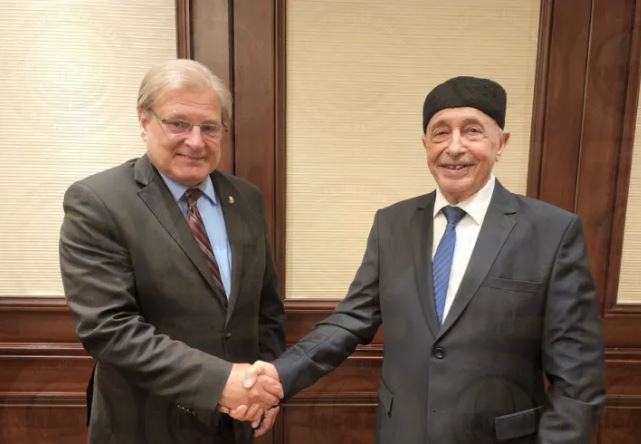Libya’s oil fields and ports will be reopened after installing a mechanism for distributing oil revenues in a fair manner to all regions Libya’s House of Representatives (HoR) Speaker Ageela Saleh told U.S. Ambassador and Special Envoy to Libya Richard Norland.
The statement, reported by HoR Official Spokesperson Abdalla Belheeg, was made during their meeting in Cairo yesterday.
Belheeg reported that the meeting dealt with the latest developments in Libya and a number of files, the most important of which are the closure of oil fields and ports, Libya’s 2022 budget, and the Fathi Bashagha government’s work from the city of Sirte.
Saleh also stressed that he will strive to resolve the oil fields and ports closure crisis, and that the next HoR session will study the draft 2022 state budget law submitted by the Bashagha Libyan government.
Basagha government will be based in Sirte – free from militia extortion
Belheeg also reported that Saleh said that the Bashagha government’s work from the city of Sirte will enable it to work freely and will not fall victim to extortion by militias or others, stressing that when he proposed the city of Sirte as a temporary headquarters for the Presidential Council and the expired Abd Alhamid Aldabaiba caretaker government, the proposal was widely welcomed locally and internationally.
Ambassador Norland’s take on the meeting
Reporting on the same meeting yesterday, Ambassador Norland said ‘‘I met HoR Speaker Ageela Saleh in Cairo today to discuss latest developments regarding Libya’s political transition.
As the HoR prepares to debate a new national budget, I reaffirmed the U.S. commitment to support a Libyan-led mechanism to manage oil revenues in a way that promotes maximum transparency and cooperation between all political forces in Libya and to facilitate early agreement on a path to parliamentary and presidential elections as soon as possible.
The Speaker confirmed HoR participation in Constitutional talks with the HCS due to resume in Cairo on May 15, facilitated by UN Special Adviser to the Secretary General Stephanie Williams.
National elections remain essential to legitimizing Libya’s political institutions and leadership in the eyes of the Libyan people and the world.’’
Background
It is worth noting that Libya now has two competing governments and Prime Ministers. The incumbent Caretaker PM, Abd Alhamid Aldabaiba, lost a (contested) parliamentary (HoR) vote-of-confidence in September 2021.
Aldabaiba is based in the seat of Libyan power: the Libyan capital Tripoli. He had been chosen by a UN-mediated process in Geneva: the Libyan Political Dialogue Forum (LPDF). He, as well as most of the international community, believes the LPDF process prescribed that he is to remain in power until elections are held. The HoR believe that his term has expired.
Elections?
The planned 24 December 2021 elections were postponed. No new date has been agreed. U.S. Ambassador Norland’s statement ‘‘National elections remain essential to legitimizing Libya’s political institutions and leadership in the eyes of the Libyan people and the world’’ points to the lack of legitimacy all of Libya’s political centres suffer.
Bashagha chosen by parliament
His adversary for the post is Fathi Bashagha, former Interior Minister under the previous Faiez Serraj administration. Bashagha was selected by the HoR in March and is backed by HoR Speaker Ageela Saleh and eastern military commander Khalifa Hafter.
Bashagha unable to enter Tripoli
Bashagha has been unable since to physically enter Tripoli to take up his post. Aldabaiba is refusing to give up his post. He sees the selection of Bashagha by the HoR as procedurally incorrect. He and his aligned militias in western Libya are preventing Bashagha from entering Tripoli.
Both men claim they do not want military confrontation
Both men claim they do not want military confrontation. Bashagha has promised he will not use force to gain power. He has claimed on several occasions he will enter Tripoli ‘‘soon’’ and ‘‘peacefully’’. He has failed to do so. Libya continues in political limbo.
It is for this reason that the HoR is considering setting up its government in Sirte. It is partially an admission that Bashagha has failed in his attempt to enter Tripoli peacefully.
Oil and ports shutdown
So called ‘‘locals’’ have since forcibly shutdown Libya’s oil production in several oilfields and ports in an effort to weaken Aldabaiba and his government in Tripoli. It is widely believed that they were instructed to do so by Hafter/Saleh.
HoR-HSC talks continue
Meanwhile, the HoR and High State Council have met in Cairo under the auspices of the United Nations in an effort to end the political stalemate by organising constitutionally based elections. There has been no positive outcome so far from the first Cairo talks. Another round of Cairo talks will take place on 15 May.
HoR calls for formal session next Monday 9 May – LibyaHerald
New Bashagha-led government to take constitutional oath on Thursday – LibyaHerald
Legality of HoR confidence vote in Bashagha government questioned – LibyaHerald









